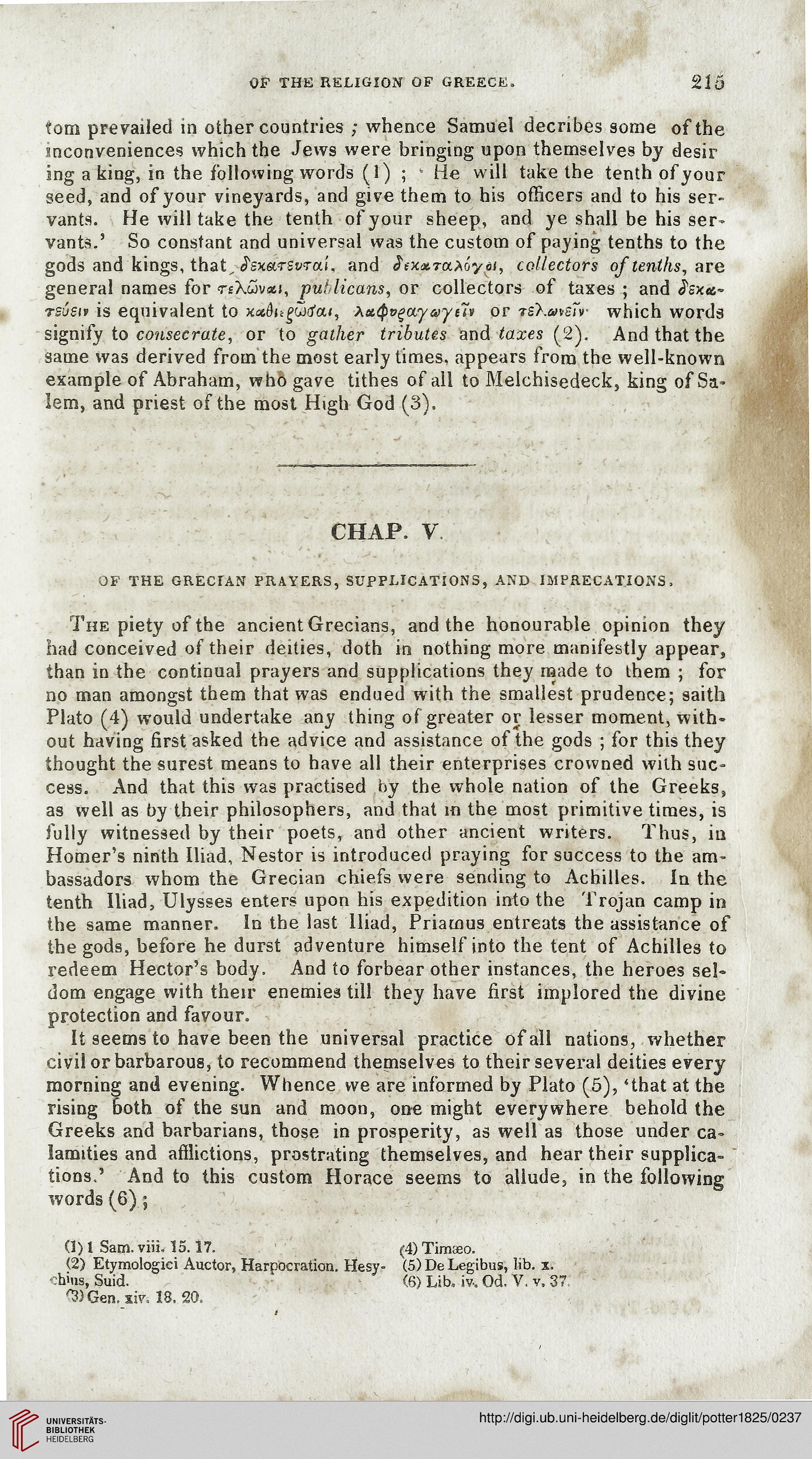of the religion of greece.
215
torn prevailed in other countries ; whence Samuel decribes some of the
inconveniences which the Jews were bringing upon themselves by desir
ing a king, in the following words (1) ; 1 He will take the tenth of your
seed, and of your vineyards, and give them to his officers and to his ser-
vants. He will take the tenth of your sheep, and ye shall be his ser-
vants.' So constant and universal was the custom of paying tenths to the
gods and kings, that, ^sxarsvrai, and S'iXxraXayai, collectors of tenths, are
general names for reXuvxi, publicans, or collectors of taxes; and <?«x«s-
rs6sif is equivalent to x*&hg&tia.i, x*<pv%ayayui or f$K&te7r which words
signify to consecrate, or to gather tributes and taxes (2). And that the
same was derived from the most early times, appears from the well-known
example of Abraham, wh&gave tithes of all to Melchisedeck, king of Sa-
lem, and priest of the most High God (3).
CHAP. V
of the grectan prayers, supplications, and imprecations,
The piety of the ancient Grecians, and the honourable opinion they
had conceived of their deities, doth in nothing more manifestly appear,
than in the continual prayers and supplications they made to them ; for
no man amongst them that was endued with the smallest prudence; saith
Plato (4) would undertake any thing of greater or lesser moment, with-
out having first asked the advice and assistance of the gods ; for this they
thought the surest means to have all their enterprises crowned with suc-
cess. And that this was practised by the whole nation of the Greeks,
as well as by their philosophers, and that m the most primitive times, is
fully witnessed by their poets, and other ancient writers. Thus, iu
Homer's ninth Iliad, Nestor is introduced praying for success to the am-
bassadors whom the Grecian chiefs were sending to Achilles. In the
tenth Iliad, Ulysses enters upon his expedition into the Trojan camp in
the same manner. In the last Iliad, Priamus entreats the assistance of
the gods, before he durst adventure himself into the tent of Achilles to
redeem Hector's body. And to forbear other instances, the heroes sel-
dom engage with their enemies till they have first implored the divine
protection and favour.
It seems to have been the universal practice of all nations, whether
civil or barbarous, to recommend themselves to their several deities every
morning and evening. Whence we are informed by Plato (5), 'that at the
rising 6oth of the sun and moon, one might everywhere behold the
Greeks and barbarians, those in prosperity, as well as those under ca-
lamities and afflictions, prostrating themselves, and hear their supplica-
tions.' And to this custom Horace seems to allude, in the following
words (6);
(1) 1 Sam. viii. 15.17. (4) Tirateo.
(2) Etymologici Auctor, Harpocration. Hesy- (5) De Legibus, lib. x.
chilis, Suid. (6) Lib. iv, Od. V. v. 37
^)Gen. xiv. 18. 20.
215
torn prevailed in other countries ; whence Samuel decribes some of the
inconveniences which the Jews were bringing upon themselves by desir
ing a king, in the following words (1) ; 1 He will take the tenth of your
seed, and of your vineyards, and give them to his officers and to his ser-
vants. He will take the tenth of your sheep, and ye shall be his ser-
vants.' So constant and universal was the custom of paying tenths to the
gods and kings, that, ^sxarsvrai, and S'iXxraXayai, collectors of tenths, are
general names for reXuvxi, publicans, or collectors of taxes; and <?«x«s-
rs6sif is equivalent to x*&hg&tia.i, x*<pv%ayayui or f$K&te7r which words
signify to consecrate, or to gather tributes and taxes (2). And that the
same was derived from the most early times, appears from the well-known
example of Abraham, wh&gave tithes of all to Melchisedeck, king of Sa-
lem, and priest of the most High God (3).
CHAP. V
of the grectan prayers, supplications, and imprecations,
The piety of the ancient Grecians, and the honourable opinion they
had conceived of their deities, doth in nothing more manifestly appear,
than in the continual prayers and supplications they made to them ; for
no man amongst them that was endued with the smallest prudence; saith
Plato (4) would undertake any thing of greater or lesser moment, with-
out having first asked the advice and assistance of the gods ; for this they
thought the surest means to have all their enterprises crowned with suc-
cess. And that this was practised by the whole nation of the Greeks,
as well as by their philosophers, and that m the most primitive times, is
fully witnessed by their poets, and other ancient writers. Thus, iu
Homer's ninth Iliad, Nestor is introduced praying for success to the am-
bassadors whom the Grecian chiefs were sending to Achilles. In the
tenth Iliad, Ulysses enters upon his expedition into the Trojan camp in
the same manner. In the last Iliad, Priamus entreats the assistance of
the gods, before he durst adventure himself into the tent of Achilles to
redeem Hector's body. And to forbear other instances, the heroes sel-
dom engage with their enemies till they have first implored the divine
protection and favour.
It seems to have been the universal practice of all nations, whether
civil or barbarous, to recommend themselves to their several deities every
morning and evening. Whence we are informed by Plato (5), 'that at the
rising 6oth of the sun and moon, one might everywhere behold the
Greeks and barbarians, those in prosperity, as well as those under ca-
lamities and afflictions, prostrating themselves, and hear their supplica-
tions.' And to this custom Horace seems to allude, in the following
words (6);
(1) 1 Sam. viii. 15.17. (4) Tirateo.
(2) Etymologici Auctor, Harpocration. Hesy- (5) De Legibus, lib. x.
chilis, Suid. (6) Lib. iv, Od. V. v. 37
^)Gen. xiv. 18. 20.




